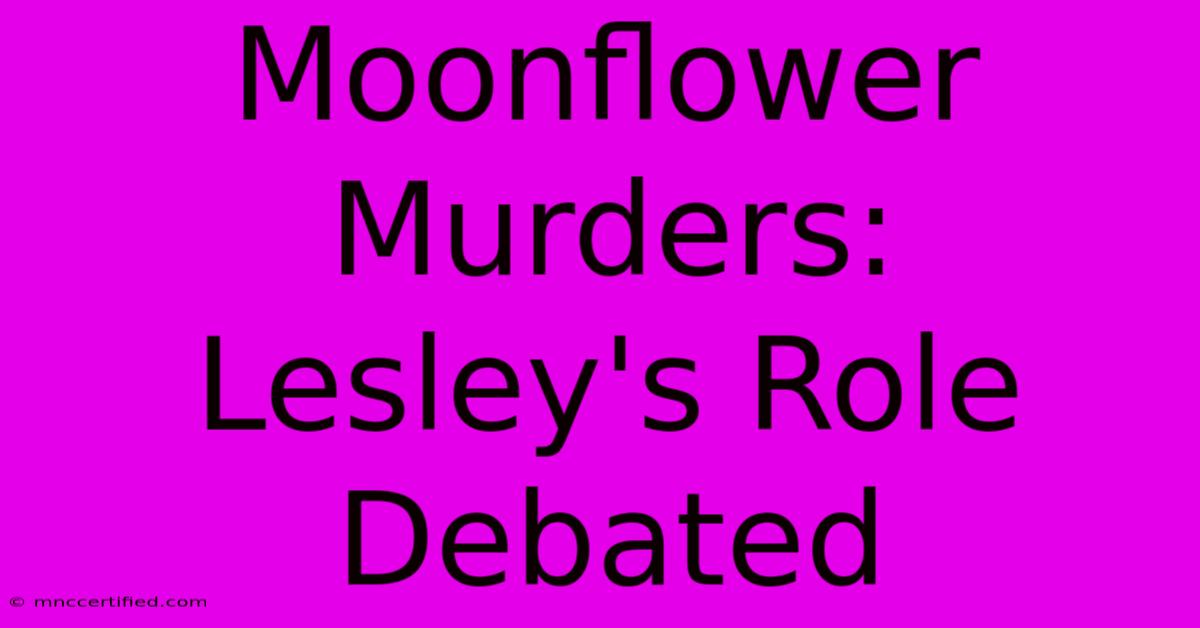Moonflower Murders: Lesley's Role Debated

Table of Contents
Moonflower Murders: Lesley's Role Debated – A Deep Dive into Anthony Horowitz's Puzzle
Anthony Horowitz's Moonflower Murders presents a complex mystery brimming with red herrings and intriguing characters. While the central puzzle focuses on the decades-old disappearance of Susan Ryeland's mother, a significant debate rages among readers: what is Lesley's true role in the events of the novel? This article delves into the various interpretations of Lesley's actions and motivations, examining the evidence and exploring the ambiguities that make her such a compelling character.
Lesley: Victim, Accomplice, or Something Else Entirely?
Lesley is introduced as a seemingly innocent, if somewhat naive, young woman caught up in the events surrounding the original disappearance. However, her seemingly simple demeanor hides a depth of complexity that fuels much of the speculation surrounding her involvement. Some readers see Lesley as a victim, manipulated by more sinister forces. Her apparent vulnerability and lack of agency make this interpretation plausible. The narrative, however, provides subtle hints suggesting a more active, perhaps even culpable role.
The Evidence for Lesley's Innocence:
- Her Apparent Vulnerability: Lesley is portrayed as young, impressionable, and potentially under the influence of stronger personalities. This makes her a likely target for manipulation, suggesting she may have been used by others without fully understanding the consequences.
- Lack of Direct Evidence: There is no direct evidence definitively placing Lesley at the scene of the crime or implicating her in any wrongdoing. Much of the speculation is based on inference and interpretation of her actions.
- Sympathetic Portrayal: Horowitz presents Lesley in a somewhat sympathetic light, highlighting her vulnerabilities and making it difficult for readers to wholly condemn her.
The Evidence Against Lesley:
- Omissions and Inconsistencies: Careful rereading reveals inconsistencies and omissions in Lesley's accounts of events. These discrepancies, while subtle, can be interpreted as signs of deliberate deception or a flawed memory influenced by self-preservation.
- Motivations: What are Lesley's motivations? While ostensibly a victim, the novel hints at underlying desires and ambitions that could provide a motive for involvement in more sinister activities. This adds a layer of complexity beyond simple victimhood.
- Connections to Other Characters: Lesley's relationships with other key characters, particularly those implicated in the original crime, warrant closer scrutiny. These connections could suggest a deeper, more calculated involvement than initially apparent.
The Ambiguity of Horowitz's Craft
The brilliance of Horowitz's writing lies in its ambiguity. He deliberately leaves room for multiple interpretations, allowing readers to engage actively in piecing together the truth. Lesley's character perfectly embodies this approach. Her role is not explicitly defined; instead, Horowitz presents a tapestry of clues, subtle hints, and carefully crafted ambiguities that challenge readers to form their own conclusions.
Unraveling the Mystery: A Reader's Perspective
The debate surrounding Lesley's role isn't merely a matter of solving a puzzle within the novel's narrative; it reflects the very nature of storytelling itself. It’s a testament to Horowitz’s skill in creating a character that is both believable and maddeningly enigmatic. The lack of definitive answers forces the reader to engage actively with the text, carefully weighing the evidence and considering the multifaceted nature of human motivation.
Beyond the Book: The Online Community and Lesley's Legacy
The ambiguity surrounding Lesley's character has ignited considerable discussion within online literary communities. Forums and social media platforms are filled with passionate debates about her role, showcasing the enduring power of a well-crafted mystery. This sustained engagement is a testament to Horowitz’s success in creating a character who continues to fascinate and intrigue long after the final page is turned. Lesley’s legacy within the Moonflower Murders universe is not simply defined by her actions within the narrative, but also by the ongoing dialogue and interpretations she inspires.
This ongoing conversation underscores the lasting impact of Moonflower Murders and the power of ambiguity in generating lasting interest and discussion around a complex character like Lesley. It's a testament to Anthony Horowitz's masterful storytelling.

Thank you for visiting our website wich cover about Moonflower Murders: Lesley's Role Debated. We hope the information provided has been useful to you. Feel free to contact us if you have any questions or need further assistance. See you next time and dont miss to bookmark.
Featured Posts
-
Australia Vs Pakistan 2nd T20 I Scorecard
Nov 17, 2024
-
Ohio State At Wrigley Fan Reactions
Nov 17, 2024
-
How Much Is Car Insurance In Spain
Nov 17, 2024
-
Jones Vs Miocic Ufc 309 Start Time
Nov 17, 2024
-
Sanders Nfl Coaching Ingrams Inquiry
Nov 17, 2024